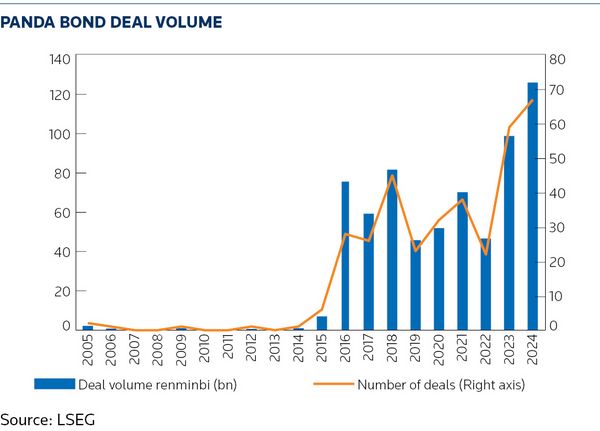![]()
Companies tapping China’s Panda bond market to take advantage of arbitrage opportunities are struggling to obtain approval to transfer the proceeds offshore.
Since January 2023, the funds raised from Panda bonds – onshore renminbi-denominated bonds sold by overseas companies – can be used offshore as long as approval is granted, which marked a relaxation of earlier rules.
But this approval has become increasingly difficult to obtain, for both overseas-incorporated Chinese companies, known as red chip Panda issuers, and foreign companies.
For instance, German carmaker BMW will keep the proceeds from this year’s Panda bonds onshore while they had the flexibility using them onshore and/or offshore for last year’s deal. Hong Kong-based conglomerate NWS Holdings will use this year’s Panda for onshore projects while all the proceeds from last year’s deal were used offshore for refinancing. China Everbright had the half the proceeds refinancing offshore debt last year, while this year all proceeds are used for onshore refinancing.
Singapore's United Overseas Bank can remit all proceeds from its recent Rmb5bn (US$698m) 2.3% three-year bond offshore, but the bank said it will keep the proceeds in renminbi for use by its Hong Kong and ASEAN branches. HSBC will price a Rmb3bn three-year Panda on November 12, and proceeds will also be remitted offshore but used for the bank's renminbi business.
The regulator’s decisions are not made public and none of the issuers have said that they were prevented from remitting funds offshore or converting them to other currencies. However, some bankers away from the deals suspect this is the case because Panda deals require a lot of effort and documentation and issuers would have found it easier to print regular onshore bonds if they only wanted to raise renminbi for onshore use. By contrast, being able to use the proceeds offshore gives issuers much more flexibility.
There are no clear criteria for what type of company or use of proceeds will get permission to move funds offshore, said market participants. The timing, the wording in the application form and geopolitical tensions are some of the factors that could affect regulators' decisions.
“We’ve seen that the approval is getting more difficult to obtain this year, but it’s hard to identify a general rule. The sectors and the geographies all matter,” said a Beijing-based banker.
China is in favour of the offshore use of unconverted proceeds, which it sees as a positive contribution to the internationalisation of the renminbi, but frowns on swaps into other currencies, which it deems to be speculation.
People's Bank of China governor Pan Gongsheng said at a conference in 2019, when he was still deputy governor, that it was “meaningless” for companies to issue Panda bonds and swap into US dollars immediately. Instead, it would be beneficial for both sides if those issuers had funding needs in renminbi, he said.
A Shanghai-based banker said that companies which manage to link the offshore use of proceeds with renminbi internationalisation or the Belt and Road Initiative in their applications are more likely to gain approval. Once the proceeds are shifted offshore, Chinese regulators have no control over the actual use of proceeds, said the banker.
Some observers said priority is given to debut foreign issuers. Most of the debut issuers this year, including CapitaLand Investment, Shangri-La Asia and Bayer, were granted approval to remit 100% of their proceeds offshore.
“Regulators encourage bona fide Panda issuers to issue more and put the proceeds outside the country to settle trades with China,” said a banker from a Chinese securities house.
Overall currency outflows, which are tightly controlled, also affect regulators' decisions. If they are too high, companies are less likely to receive a positive response from the regulator, although some suggest that issuers could wait for another two to three months to try again.

Record year
The Panda bond market has had a record year in both deal volume and deal count, boosted by the relaxed rules and cheap onshore rates. So far this year, 67 deals have raised a combined Rmb126bn (US$17.6bn), up from 59 bonds worth Rmb99bn last year, according to LSEG data.
“We’ve seen more diversity in issuers this year,” said Samuel Fischer, head of China onshore debt capital markets at Deutsche Bank. “The deal volume is boosted by an increase of new issuers in the market, more demand from foreign investors who continue to invest in renminbi, and clearer regulation on transferring proceeds offshore."
The product has been in the market for almost two decades but failed to take off before this year, mostly because of the complicated approval and documentation process. The relaxation of the use of proceeds gives companies more flexibility and allows them to benefit from cheap onshore funding. But tighter controls could hinder future deal supply.
The process to transfer proceeds offshore can be uncertain and time-consuming. The first approval is required when companies are applying for a Panda bond issuance quota, which is valid for two years, when the regulator will inform them what percentage of the total amount can be remitted offshore.
When companies issue off the quota, a separate approval is required for each deal. Bankers said regulators usually will not give a definitive negative response and companies may need to wait longer or modify their applications before being given a green light. The National Association of Financial Market Institutional Investors, the PBoC and the National Development and Reform Commission are all involved in the process, said bankers.
Despite the challenges, Fischer has confidence in next year's prospects as some sovereigns may tap the market. For instance, Pakistan has been talking to banks and multinational development banks for a potential Panda bond debut.
"We’ve seen some five-year bonds this year, and we hope we could see deals that extend the curve further, especially from foreign issuers,” he said.